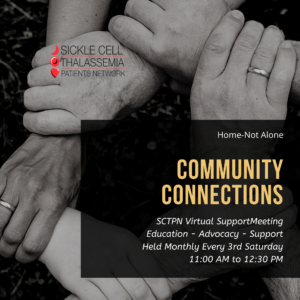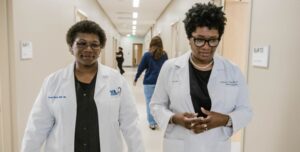A question was posted on Facebook asking “How have you dealt with the lack of information regarding your condition?” That question has spurred this response.
There are many reasons why doctors, nurses, and social workers do not pass on vital information to you during the time of your interaction. Time is the number one factor. However, there is only one reason you leave an interaction with a clinician without the information you need to know – you did not ask. the National Enquirer magazine made a play on words for the company’s slogan, “Enquiring minds want to know.”
Inquiring Minds Want to Know
King James translation of Matthew 7:7: “Ask, and it shall be given you; seek, and ye shall find; knock, and it shall be opened unto you.”
 We are well aware that most people living with sickle cell disease (SCD) are not well informed about this condition. The responsibility to be in the know is yours. People have been conditioned not to ask questions in order not to appear stupid, nosy, or troublesome.
We are well aware that most people living with sickle cell disease (SCD) are not well informed about this condition. The responsibility to be in the know is yours. People have been conditioned not to ask questions in order not to appear stupid, nosy, or troublesome.
Children ask questions all of the time and have the expectation that the adults around them can and will answer. For some, at a point in their development, they are told so often to stop asking questions that they finally do. Moreover, doctors have been attributed with an omnipresence by traditionalists (elders over the age of 70) that doctors should not be questioned, we should just listen and do what she/he says. This mentality has certainly been detrimental, particularly to Black, Brown, and poor people. After Walter Clement Noel, a Grenadian national introduced SCD to the American medical society in 1910, focused research ensued from 1945 to 1979. As the research physicians learned more about the disease, they shared the information with their patients and their families. It was truly a benefit to our wellbeing and survival to be armed with information about the anomaly of the sickling red blood cell. Yet, there was a loot that was still unknown, because some scientific methods for the investigation of this hemoglobinopathy did not exist. Honestly, we can give a lot of credit to the pediatricians of the time, who increased the knowledge of sickle cell disease in families and the community.
The Role of Advocate
The inquisition into sickle cell anemia woke the desire of young adults thriving with SCD to help others and to coalesce families living with SCD into a broader community. This is how the Sickle Cell Thalassemia Patients Network (SCTPN) was bourne.
As advocates for a rare disease that most of us are living with, we understand the need to be properly educated and supported to live healthier. Advocates wear the mantle of educator, healer, and protector. The Educator in us wants to share with you that the responsibility of learning about sickle cell disease is yours.
It is erroneous to think that there is a “lack of information” about sickle cell available. As seen in the image above, a Boolean search for sickle cell disease produces 31.9 million results to this query. Information exists, we have to take the time to seek it out. SCTPN has a Resource Center page on the website full of links to information resources. Click here to visit https://sctpn.net/resource-center/.
On your visits to see your doctor or nurse practitioner, you should be prepared with a list of questions you would like to have answered. If your home hospital or local SCD community organization offers support group meetings, you should attend. Support group meetings are the environment where affected individuals, caregivers, and friends learn about sickle cell and how to navigate living healthy with a chronic disorder.
In this day of #physicaldistancing informative, support meetings are held virtually on Zoom and FB Live. SCTPN’s Community Connections, and Kings County Support Group meetings take place monthly on the 4th Saturday, and 2nd Tuesday respectively. Notices for these meetings are always posted on the FB Timeline @SCThalPatientsNetwork, Like Page @SCTPNWalk, on IG and Twitter @SCTPN. Our community partners and collaborators throughout New York State, across the country, and around the world also host public education events. All advocates and advocacy organizations work daily with the intent to increase public awareness and education about sickle cell disease. We invite you to come to our well and drink deeply.
We will say with great confidence that most of the men and women who dedicate their adult lives and their careers to caring for children and adults living with sickle cell disease are good people who are:
- Compassionate;
- Committed;
- Diligent; and
- Responsible
In their duties as clinicians working to diagnose, treat, and manage our care. The quality of our lives should not rest solely in their hands…it should be share. In any relationship, two people must commit to the work necessary to build trust, understanding, reliability, and positive outcomes.
We are with you on this journey of knowing and growing. We can’t do it alone. Join us (advocacy CBOs) in our efforts to educate and elevate the status of sickle cell disease publically. With 1ViralVoice we will be heard and we will foster the changes we want to see for sickle cell globally.
The Sickle Cell Thalassemia Patients Network started as an adult support group at the then Brooklyn Jewish Hospital, now Interfaith Medical Center in the 1980s, and was incorporated in the State of New York as a nonprofit charity in April 1992. SCTPN received its tax-exempt status shortly thereafter. Its mission is to improve the quality of life for individuals and families living with Sickle Cell Disease through education, referral to needed services, and other resources.
Contact us by email: social@sctpn.net or by telephone: (347) 522-8485.




